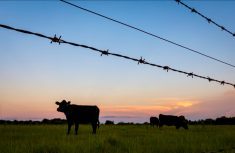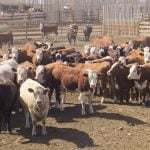Workers at Cargill’s major beef slaughter and packing plant in Alberta will vote this week on a new offer which it’s hoped will avert a strike or lockout, both due to start Monday.
The new offer follows a “marathon” of negotiations Tuesday between Cargill representatives and the bargaining committee for United Food and Commercial Workers (UFCW) Local 401, which represents the 2,000-plus employees at the plant near High River, south of Calgary.
“After a long day of collaborative discussion, we reached an agreement on an offer that the bargaining committee will recommend to its members,” Cargill said in an emailed statement Wednesday.
Read Also

Ample supplies and improved livestock sector to boost Canadian feed sector: FCC
Abundant feed grain supplies and improved profitability for the livestock sector should support strong feed demand and sales through the winter, says a new report from Farm Credit Canada.
Plant workers are to vote on the agreement Thursday, Friday and Saturday, the company said.
Cargill said the agreed-upon offer is “comprehensive and fair and includes retroactive pay, signing bonuses, a 21 per cent wage increase over the life of the contract and improved health benefits.”
The union, in a separate statement Wednesday, said the proposed deal also improves health benefits and “significant contract provisions to facilitate a new culture of health, safety, dignity, and respect in the workplace.”
The signing bonus, COVID-19 bonus and retroactive pay could amount to a total bonus of more than $6,000 for many members three weeks before Christmas, the union said.
High River workers’ previous collective bargaining agreement ran to the end of 2020. The employees on Nov. 4 had voted in favour of strike action and UFCW served strike notice on Nov. 10, putting workers in position to strike on Monday, Dec. 6, just after midnight.
Workers last week had voted to reject an offer from Cargill as per the recommendation from the UFCW bargaining committee. Cargill then responded with a lockout notice, also effective Dec. 6.
‘Best in Canada’
Either way, as was made clear in 2020 due to COVID-19 outbreaks among employees — and in 2013 during a major flood in the area — work stoppages at High River can weigh on throughput of beef cattle across Western Canada.
The plant has capacity to slaughter about 4,500 cattle per day and is estimated at about 36 per cent of Canada’s domestic beef processing capacity.
UFCW on Wednesday described the new offer as “a dramatic improvement from the offer that union members saw last week and will significantly improve Cargill workers’ lives,” adding it “would be the best food processing contract in Canada” if ratified.
UFCW 401 president Thomas Hesse, in the union’s release, said the High River workers “have stood strong and demanded justice, and I’m happy to see that our bargaining committee finally feels that something fair has been proposed.”
For his part, Hesse said he has “mixed feelings about this… Our members may or may not accept the offer. If they don’t, I’ll join them on the picket lines in solidarity and on strike. If they do accept it, I’ll work with them every day to make Cargill a better workplace.”
In a separate statement Monday on its Facebook page, UFCW 401 had said it learned Cargill has been “securing a large number of buses, likely to bring scab labour into the plant to do the work of Cargill employees” and was also “erecting fences around the plant to limit access to its facilities in the event of a strike.”
Cargill didn’t mention such measures in its statement Wednesday, but said that as it “navigate(s) this negotiation, we continue to focus on fulfilling food manufacturer, retail and food service customer orders while keeping markets moving for farmers and ranchers.”
The union on Monday also said provincial legislation has recently passed that “could limit or restrict the striking abilities of Cargill union members in ways that could severely hurt our chances of getting a fair deal.” — Glacier FarmMedia Network
















